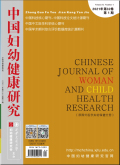中国妇幼健康研究2024,Vol.35Issue(7):1-11,11.DOI:10.3969/j.issn.1673-5293.2024.07.001
孤独症儿童的肠道菌群特征分析和筛查模型构建
Characteristic analysis of gut microbiota and screening model construction in children with autism spectrum disorder
摘要
Abstract
Objective To investigate the differences of gut microbiota composition between children with autism spectrum disorder(ASD)and health children,and to construct a disease screening model using machine learning algorithm to provide a non-invasive method for autism screening based on biomarkers of gut microbiota.Methods From December 2019 to April 2023,this study recruited 149 ASD children aged 2.5 to 4.5 years from Jinan,Zunyi,Hong Kong and Shanghai,as the autism group.Additionally,149 healthy children matched 1∶1 by age and gender were recruited as the control group.Fecal samples were collected,and gut microbiota-related indices were gathered through 16S rRNA gene V3-V4 region sequencing for both groups.At the genus level,four machine learning algorithms,random forest,support vector machine,K-nearest neighbors,and naive bayes classifier,were used to construct an autism classification model in the model development dataset,identifying the most discriminative bacterial genus combinations,and the generalization ability of the models was evaluated in two independent external test datasets.Results ①The gut microbiota diversity of the autism group was significantly higher than that in the control group(Chao index=118.00,105.00;Shannon index=3.46,3.00;P=0.023,0.001).②There were significant differences in gut microbiota structure between autism children and control children(F=5.198,R2=0.052,P<0.001).③ A total of 14 characteristic genera were identified.The genera with higher abundance in the autism group were Phocaeicola,Anaerobutyricum,Faecalibacterium,Blautia,Oscillibacter,Lachnospira,Parabacteroides,Flintibacter,and Anthropo gastromicrobium,and the genera with higher abundance in the control group were Ruthenibacterium,Flavonifractor,Bifidobacterium,Anaerostipes,and Eisenbergiella.④The random forest model based on the combination of 14 genera showed the best classification performance in the model development dataset,with the training set AUC of 100% (95% CI:100% -100% )and validation set AUC of 93.94% (95% CI:88.13% -99.74% ).In two independent external test datasets,the Naive Bayes model showed the best generalization performance,with AUC of 63.83% (95% CI:51.99% -75.67% )and 60.19% (95% CI:47.83% -72.55% ),respectively.Conclusion There are significant differences in the gut microbiota communities between autism children and control children,and specific gut microbiota biomarkers have the capability to classify autism disease states,suggesting that gut microbiota has potential significance as a non-invasive screening biomarker for early autism detection in children.关键词
肠道菌群/孤独症/儿童/生物标志物/机器学习/16S rRNAKey words
gut microbiota/autism/children/biomarkers/machine learning/16S rRNA分类
医药卫生引用本文复制引用
庞许颖,张强,王玥珠,赵红洋,郑华军,蒋泓..孤独症儿童的肠道菌群特征分析和筛查模型构建[J].中国妇幼健康研究,2024,35(7):1-11,11.基金项目
国家自然科学基金(82181220077,8237120466) (82181220077,8237120466)
复旦大学公共卫生学院嘉定区卫生健康委公共卫生高质量发展重点学科、重点专项(GWGZLXK-2023-04) (GWGZLXK-2023-04)
上海市加强公共卫生体系建设三年行动计划(2023-2025年)重点学科(GWVI-11.1-32) (2023-2025年)

